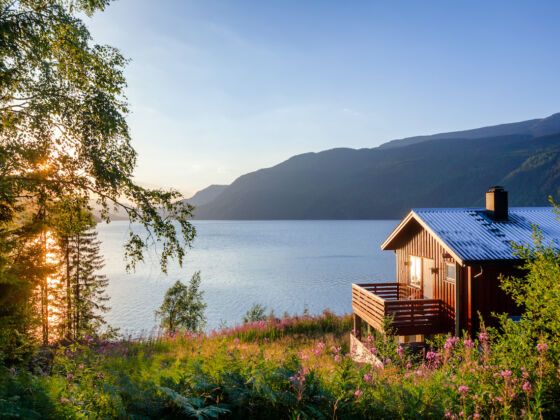In the “before times,” as the era before the onslaught of COVID-19 has affectionately come to be known, I hopped on planes without a second thought. My partner and I traveled to London and Los Angeles; I flew solo to Charleston, South Carolina, and Paso Robles, California, for work. This was all within the space of a couple months just before the CDC recommended that families quarantine at home and the governor of my home state of New Jersey shut down all non-essential businesses. I had become so accustomed to my unimpeded access to travel that I could not imagine or accept a reality in which I wouldn’t even go near an airport for a full year. But that’s exactly what happened. I went from being a person for whom travel was a regular part of my routine to rarely leaving my living room.

That doesn’t mean the occasional vacation is out of the question; I just have to do it in a way that doesn’t put my quarantine bubble (which includes three cats, young children, and high-risk adults) at risk. So instead of booking a hotel, hopping on a plane, or making a reservation at our favorite restaurant, my partner and I seek out isolated cabins in the woods or the mountains as far away from civilization as we can manage — as long as it’s within driving distance of our home in New Jersey.
Last November, we tracked down a tiny house on the side of a mountain near Phoenicia, New York. Our activities were all outdoors: We explored nearby hiking trails, a waterfall, and a botanical garden (mostly abandoned and barren in the winter). We actively limited our exposure to other people. Although we drove through the town of Phoenicia once, we didn’t leave the car and only stopped to order burgers and shakes at a pick-up window.
Our host kept his distance, too, which was an essential element of making this plan work. When we arrived at the cabin, we walked down a stone path to the main house where we retrieved the key from six feet apart on the outside deck (masked up of course). A brief exchange of pleasantries was all that was necessary before we retreated to the hilltop cabin, not interacting with the host again until we dropped off the key before leaving.
Because we never parked the car and explored any of the nearby towns on foot, ate at a restaurant or bar, or stepped into a shop, the pace and purpose of our weekend-long mini-vacation was totally different than before the pandemic. We didn’t pick up any souvenirs or do shopping of any kind (the only time we went indoors besides the grocery store was to get coffee from a machine inside a gas station), so the trip became less focused on acquiring material and more about inventing our own kind of adventure. We spent the daylight hours driving through uncharted territory, looking out for random trails to traverse.
At night, we cooked our own food and popped open a bottle of wine we brought from home. Before the pandemic, we would have ventured into town to track down a cozy dive bar and spend our evening carousing with the locals there.
Once it got dark outside, we poured more wine and set about making a roaring, sizzling fire that we sat beside for hours, mostly in silence, watching the stars blink to life. At least one night of a typical vacation would probably have been spent in a crowded, loud restaurant — and don’t get me wrong, loud and crowded restaurants are among my favorite places on the Earth. But being extra careful about maintaining our safety — and frankly our distance from other human beings — forced us to find pleasure in a peaceful, quiet, isolated getaway that prioritized reflection and communion with nature over socializing and shopping.
It doesn’t take a global pandemic to plan a vacation that centers spending all your time outdoors, appreciating the majesty of the woods, clear skies full of stars, and the soothing burble of a nearby river. Plenty of people have always shaped their vacations around this type of itinerary long before the pandemic was even a thought in the back of our minds. But vacationing in the time of COVID offered me a jolt of perspective: Getaways can be low-maintenance affairs that cater more to wandering without a plan than structured activity.
Especially in the era of social media updates and Instagram posts, it was a useful reminder that even though I’m mourning the jet-setting travel I did before the pandemic, it is far from the only fulfilling type of travel. And perhaps taking a break from an ever-rotating schedule of flights forced me to check my privilege, and remember that being able to travel in any capacity is a blessing right now.
The pandemic has taken away one of our most valuable resources — our time — and finding ways to feel like I have agency over my life again has been so beneficial to my mental health. But it’s also robbed us of so much human life, so it’s paramount that if we do venture out in the world, we do it in a way that protects not just ourselves but anyone else that we encounter along the way.
We found another isolated cabin in the woods, and we’re going on another weekend-long getaway three months after the first. I picked a spot away from a city and near trails that lead into a forest. I’m looking forward to escaping the living room for just a couple days. These mini-vacations swap one type of solitude for another, but at least we are momentarily released from the monotony of lockdown life. I don’t know when I’ll be back on a plane, but for now I’m satisfied skipping the planes and driving into the woods instead.